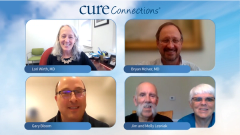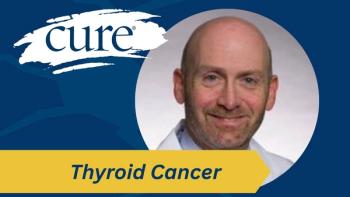
A Patient’s Journey With Differentiated Thyroid Cancer
Jim Lesniak shares his experience of receiving a diagnosis of and being treated for differentiated thyroid cancer.
Episodes in this series

Transcript:
Lori Wirth, MD: Jim, I’d love to hear from your perspective about what it’s been like to be diagnosed and treated for thyroid cancer and be on therapy for iodine-refractory thyroid cancer. Maybe you could tell us a little bit about how you were first diagnosed and what you’ve been through.
Jim Lesniak: Back in October of 2014, I felt a lump in my neck, and I happened to have a 6-month checkup in November with my primary doctor. I showed it to him. He, in turn, had me get an x-ray, an ultrasound, and then ended up doing a needle biopsy. When I found out it was cancer—the section of Massachusetts I live in is in the western part—I said it was time to get out of here and head to Boston. My sister, who had her parathyroid removed a few years earlier, contacted her surgeon out there. Two days later, I am in the surgeon’s office and within a month I was scheduled for surgery. For the surgery, she removed my thyroid, parathyroid, the vagus nerve, reconstructed my jugular vein, and took out 76 lymph nodes, and then she hooked me up with an endocrinologist out there. We, in turn, drink the radioactive iodine, I-131. But a year later, tumors came back. I went back in for another surgery and had 2 tumors and 10 more lymph nodes removed.
Less than a year later, 2 more tumors wrapped around my carotid artery. My surgeon went back in and removed those and said that’s it, I can’t go back in anymore. It’s too much scar tissue. Too much came back again. This is where I am at with Dr Wirth because my endocrinologist went as far as he could. Then we went on a couple of experimental drugs, and the 1 I take now I believe is for cancer for kidneys and thyroid. I think when I started it, I had 7 tumors, a couple in my neck and 5 in my lungs, and this drug shrunk them, and couple of them, I believe, disappeared. I am still on it after 2 years. Yes, there are side effects. You learn to live with them, or you try to figure out what is causing them, adjust to it, and then learn from that.
Lori Wirth, MD:Jim, I am sorry to interrupt, but I wanted to go back and ask you about just what the experience was like from when you had that first recurrence, then had another surgery, and then another recurrence and then another surgery. It must have felt like things didn’t go originally as planned and it must have felt relentless that your cancer kept on coming back.
Jim Lesniak: It probably didn’t bother me as much as it should have. The first time I went to Massachusetts General Hospital, I got in the elevator and there was a 2 or 3-year-old boy in the elevator with cancer. I saw him and I said I am 60. I have already had a good life; he is just starting out. No matter what I have, somebody is always worse than I am. That’s the way I have taken it ever since. I go on stride, I got confidence in the surgeons and doctors, and we are going to conquer this. I don’t think it bothered me as much as it should have.
Lori Wirth, MD: Don’t start looking for it to bother you more now, please.
Jim Lesniak: I don’t plan on it. My philosophy when I went in for my first surgery was that I told Dr Stevens, you’ve got all the work to do, and I am going to sleep there in surgery. I pointed to my wife and said she is going to do the worrying, not me.
Molly Lesniak: That’s what I do.
Jim Lesniak: Worrying is not going to accomplish anything. It’s not going to make it go away, so you just go with the flow.
Lori Wirth, MD: I like your strategy. You make everybody else do the heavy lifting.
Jim Lesniak: Exactly.
Lori Wirth, MD: Actually, I am kidding there. I tell you my job is easier than yours, Jim. You have been doing the heavy lifting in terms of going through all the treatment that you have had and dealing with being on a multikinase inhibitor and dealing with the impact with symptoms and quality of life and so forth.
Jim Lesniak: Being on some of these targeted drugs, I know my body and what’s right and what’s wrong and my downfall is I don’t tell you until it’s too late, and I usually come to you afterwards. I think a few times you said to Molly, “Will you call me next time?” Because you know I don’t.
Lori Wirth, MD: I remember saying that at least once.
Molly Lesniak: A couple of times.
Transcript edited for clarity.





